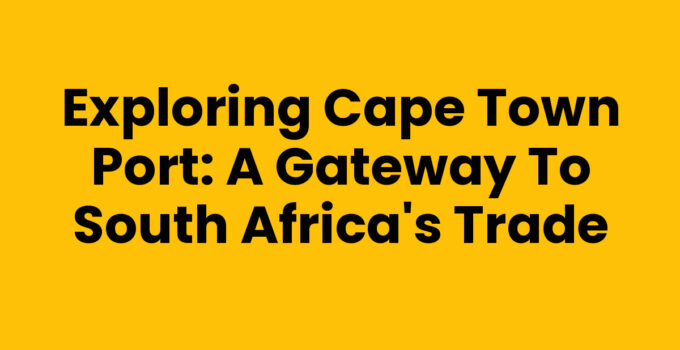Cape Town, with its stunning landscapes and rich history, is not just a popular tourist destination—it is also home to one of the most important ports in Africa. The Cape Town Port serves as a pivotal point for trade and maritime activities, connecting South Africa to global markets. In this article, we will explore the significance, history and attractions of Cape Town Port.
Cape Town Port: A Hub of Trade and Activity
The Cape Town Port, officially known as the Port of Cape Town, is strategically located on the southwestern coast of South Africa. This port is considered among the busiest in the Southern Hemisphere and plays a crucial role in accommodating bulk vessels, maritime logistics, and tourism.
Historically, Cape Town Port has served as a vital rest and supply station for ships sailing to the east and west, especially during the age of sail. Today, it stands as a functional hub that supports various maritime activities:
- Container Operations: Handling a significant portion of South Africa’s container traffic, facilitating imports and exports.
- Tourism: Welcoming cruise ships and tourism vessels, allowing tourists to explore the city and its surrounding attractions.
- Fishing Industry: Supporting commercial fishing activities thanks to its proximity to productive fishing grounds.
- Industrial Activities: Hosting numerous businesses and industries that rely on efficient shipping routes.
For anyone looking to understand the dynamics of trade in South Africa, Cape Town Port represents a fascinating study of growth, logistics, and commerce.
Related Guide: Explore the Vibrant Culture and Attractions of Cape Town City
Exploring the Attractions Around Cape Town Port
The Cape Town Port area is not just about trade; it is also a vibrant hub for tourists and locals alike. Here are some must-see attractions near the port:
- V&A Waterfront: A bustling area filled with shops, restaurants, and entertainment options. Handcrafted goods, artisan markets, and delicious eateries make this a cultural hotspot.
- Two Oceans Aquarium: Located within the V&A Waterfront, this aquarium features marine life from both the Indian and Atlantic Oceans, making it educational for all ages.
- Table Mountain: A short distance from the port, this iconic location offers hiking trails and a cable car for stunning views of Cape Town from above.
- Robben Island: A must-visit for history enthusiasts, where Nelson Mandela was imprisoned during apartheid. Tours depart regularly from the waterfront.
These attractions provide a unique blend of leisure, culture, and history, allowing visitors to appreciate both the natural beauty and historical significance of the region.
Check This: Explore the Best Bus Tour In Cape Town: Top Sights & Tips
Understanding the Economic Impact of Cape Town Port
The economic significance of Cape Town Port cannot be overstated. As one of the gateways into South Africa, it does not only support the local economy but also has implications for international trade. Here are key points to consider:
- Job Creation: The port generates thousands of direct and indirect jobs in logistics, shipping, tourism, and local businesses, bolstering the community’s economic growth.
- Trade Facilitation: It is instrumental in facilitating the import and export of goods, which is vital for the manufacturing sector, agriculture, and other industries.
- Tourism Boost: The influx of tourists enhances revenue for local businesses, contributing significantly to both the region and national economy.
The ongoing investment in infrastructure and modernization at the Cape Town Port emphasizes its importance. These developments are essential for maintaining efficiency and ensuring Cape Town’s competitive position in global trade.
Read Also: Finding a Woman Seeking Men in Cape Town: Your Ultimate Guide
Conclusion
Cape Town Port is more than just a logistical powerhouse; it is a key player in South Africa’s economy with historical significance and a vibrant atmosphere. Its multifaceted roles in trade, tourism, and local industry make it an essential part of Cape Town’s identity. Whether you are a business professional, a tourist, or a local resident, the port’s impact is felt throughout the region.
As you explore Cape Town, don’t miss the opportunity to delve into the activities and stories that make Cape Town Port such a vital asset to this beautiful city.
Further Reading: Top Security Company In Cape Town: Protect What Matters Most
Frequently Asked Questions
What is the historical significance of Cape Town Port?
Cape Town Port has been a strategic supply station for maritime trade since the 17th century, playing a crucial role in global navigation and commerce.
What attractions are located near Cape Town Port?
Nearby attractions include the V&A Waterfront, Two Oceans Aquarium, Table Mountain, and Robben Island, each offering unique experiences for visitors.
How does Cape Town Port contribute to the local economy?
The port creates jobs, supports trade, and boosts tourism, making it a vital part of the local and national economy.



